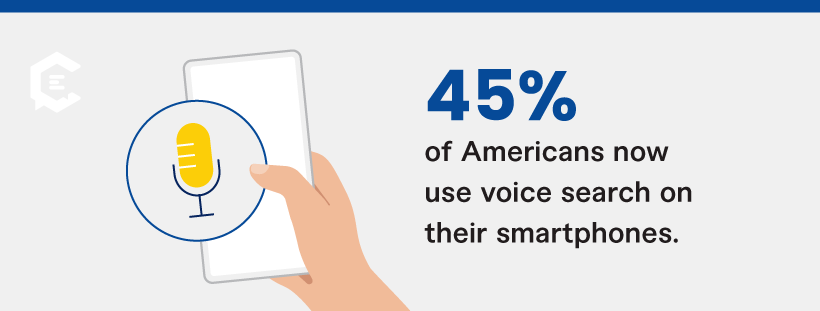What is voice search?
Voice search lets you speak search queries instead of typing them. This hands-free technology uses voice recognition software to understand and process spoken words, with assistants like Siri, Alexa, and Google delivering results.

Why is voice search important?
Voice search is important because it’s changing how people search online. Almost half of Americans (45 percent) now use voice search on their smartphones, and 34 percent of people own a smart speaker.
For marketers, this means rethinking how you create and optimize content. Your content strategy needs to match how people actually speak, not just how they type.
Here’s why voice search matters:
- Just like voice-to-text on phones, this technology lets users search quickly (no typing necessary), making it possible to multitask
- With the popularity of smartphones and smart speakers, voice search is becoming an integral way for people to search online
- Voice search is typically more natural and conversational, which means marketers will need to modify how they use keywords and content
- Many voice searches are location-based, which presents a huge opportunity for local business owners
How to Optimize for Voice Search
While your content strategy will need to be updated to target voice searches, it won’t need a complete overhaul.
You can make your content voice search-friendly with a few simple modifications.
Target conversational keywords
Use long-tail keywords and phrases that reflect how people naturally speak. These highly specific conversational terms can help you rank for text and voice queries.
Focus on phrases like:
- “How do I fix a leaky faucet”
- “Where can I buy cupcakes near me”
- “What’s the closest Italian restaurant open now”
- “How much does it cost to replace windshield wipers”
Use a keyword research tool like Ahrefs or Semrush to find long-tail keywords — filter by “questions” to get more targeted results.
Optimize for questions
Lead with who, what, where, when, why, and how in your headers and content. Voice searchers ask complete questions, so structure your content as direct answers to their specific queries.
Here’s how:
- “Who” queries: Expert profiles, company history, team bios
- “What” queries: Definitions, product details, service explanations
- “Where” queries: Location-based searches, store finders
- “When” queries: Events, business hours, availability
- “Why” queries: Benefits, explanations, comparisons
- “How” queries: Tutorials, guides, step-by-step instructions
Enhance local SEO
“Near me” searches are one of the top reasons people use voice search. This means it’s more important than ever to create a local SEO strategy.
This includes:
- Maintaining consistent NAP (name, address, phone) data across all platforms
- Creating location pages with landmarks and neighborhood mentions
- Adding local modifiers like “downtown Seattle” or “Lake Union area” to keywords
- Keeping business hours and seasonal promotions current
- Highlighting nearby events and local news that impact your business
Create featured snippet-friendly content
Structure your content to win position zero in voice search results.
- Write clear 40-60 word definitions at the start of key sections
- Use numbered lists for step-by-step processes
- Create comparison tables for products and pricing
- Add relevant schema markup to help search engines understand context
- Include descriptive subheaders that match common voice queries
- Format FAQ sections with direct question-answer pairs
Improve page load speed
Voice search users expect quick answers, so ensure your site loads quickly on both desktop and mobile.
Optimize your site by:
- Compressing images with a tool like TinyPNG
- Implementing browser caching
- Minifying CSS, JavaScript, and HTML
- Using a CDN for faster content delivery
- Test regularly using Google’s PageSpeed Insights
Voice Search and Content Marketing
The future of search is speaking your customers’ language (literally). As smart speakers and voice assistants become part of daily life, optimizing for natural speech patterns can help you reach more customers and increase brand awareness.
Focus on conversational content that answers real questions, and you’ll build stronger connections while staying ahead of the curve.
Need help optimizing your content for voice search? Our top-tier writers will create natural, conversational content that captures voice queries and attracts your audience. Talk to a content specialist about voice-first content today.





